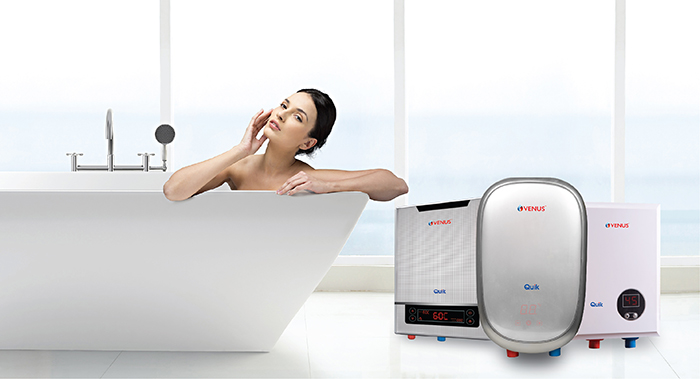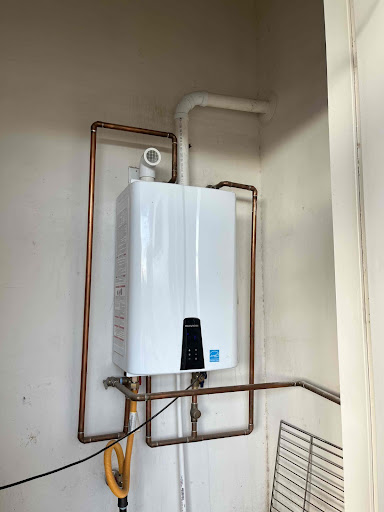Starting With Energy Savings To Space Efficiency: The Benefits Of Tankless Water Heaters
Starting With Energy Savings To Space Efficiency: The Benefits Of Tankless Water Heaters
Blog Article
We've encountered this post involving 5 Benefits of Tankless Water Heaters listed below on the net and reckoned it made perfect sense to quickly share it with you over here.

In a globe where convenience and performance reign supreme, it's not a surprise that home owners are continuously in search of smarter ways to handle their home's power consumption and comfort. One development that has progressively gotten popularity is the tankless water heater. But just what makes these systems attract attention from the standard tank-based models the majority of us grew up with? Allow's dive in and check out the benefits of tankless water heaters, helping you decide if it's time to make the switch in your home.
Intro
Image this: you enter the shower after a long day, expecting a comforting cascade of hot water, only to be welcomed by icy beads since the last person used it all up. Sound familiar? Traditional hot water heater keep a fixed amount of warm water, implying you go to the grace of that container's supply. Tankless systems, on the other hand, heat water as needed. No more going out mid-shower, say goodbye to wrestling with routines simply to ensure hot water is offered.
Recognizing Tankless Water Heaters
What Are Tankless Water Heaters?
Tankless water heaters, in some cases referred to as on-demand or immediate hot water heater, give hot water just as it's needed. Instead of keeping gallons of pre-heated water, these devices kick into activity the minute you switch on the tap. Water travels through a warmth exchanger, heating up in real-time, indicating you obtain an undisturbed flow of warm water without the requirement for a big container sitting lazily by.
Exactly how Do They Differ from Standard Equipments?
Typical heating units hold a storage tank of warm water, making use of energy to maintain that storage tank at a regular temperature. Tankless systems eliminate the standing supply, minimizing wasted power and the cumbersome footprint of a large cylinder. Essentially, you're upgrading from a "accumulation" attitude to a "made-to-order" technique.
Common Kinds Of Tankless Systems
Tankless water heaters normally can be found in two ranges: gas and electric. Gas designs often tend to supply greater circulation rates, suitable for bigger households, while electric designs typically offer smaller sized homes and are generally simpler to set up. Furthermore, some systems are developed for point-of-use (offering one component) while others can deal with the entire home's hot water demands.
Secret Benefits of Tankless Water Heaters
1. Countless Warm Water Supply
Ever had to set up showers so everyone obtains their fair share of hot water? With tankless, that ends up being a distant memory. As long as the heating system's circulation capability isn't surpassed, you can take back-to-back showers without becoming a popsicle.
2. Energy Efficiency and Cost Savings
No more warming a giant container's well worth of water and maintaining it toasty all day. Tankless heaters decrease standby energy losses, which can decrease energy costs. While the preliminary cost might be greater, the long-lasting financial savings typically validate the financial investment.
3. Space-Saving Style
If your home is short on storage space, removing the large storage tank maximizes useful space. Tankless devices are small and can often be placed on wall surfaces, hidden in edges, or mounted in tight energy storage rooms without monopolizing the whole room.
4. Longer Life expectancy
A well-maintained tankless water heater can outlive its tank-based relative. Standard containers may last 10-15 years, while tankless designs can keep chugging along for twenty years or even more, making them a solid investment with time.
5. Improved Water Top Quality
Saving water in a storage tank can often cause sediment accumulation or a slightly "off" preference. With tankless systems, fresh water is heated up on the spot, decreasing the chances of sediment buildup and potentially supplying cleaner-tasting water.
Considerations Prior To Changing
Though the benefits are engaging, it's important to consider a couple of aspects prior to completely dedicating.
Preliminary Financial Investment Prices
Tankless heaters commonly come with a higher upfront price tag. In between the system itself and potential setup adjustments, the first expense may offer you sticker shock. However keep in mind to view it as a long-term financial investment.
Installation Demands
Relying on your home's infrastructure, you might require additional electrical capacity or gas line upgrades. Ensure you understand the installment needs and seek advice from a specialist to stay clear of surprises.
Reviewing Your Home's Water Usage Patterns
If your home simultaneously uses several fixtures with high hot water need, make sure the unit's flow price meets your needs. Knowing your usage patterns aids you pick the appropriate size and type of tankless heating system.
Upkeep and Care Tips
Tankless systems are fairly reduced upkeep, however they aren't set-it-and-forget-it appliances.
Routine Cleansing and Descaling
Difficult water minerals can accumulate in the heat exchanger, influencing efficiency. Routine descaling (typically suggested annually) maintains the system performing at peak performance.
Annual Expert Assessments
A yearly checkup from a specialist makes sure small issues are caught early. They'll analyze the device's efficiency, try to find leaks, and assist maintain ideal effectiveness.
Ensuring Proper Ventilation
For gas versions, appropriate ventilation is important to safely remove exhaust gases. Ensure airing vent systems are clean and correctly set up to stop any possible security risks.
Contrasting Different Brands and Models
Not all tankless water heaters are developed equivalent.
Investigating Reputable Manufacturers
Seek credible brands with a history of producing high quality devices. A trusted producer commonly provides better client assistance and longer warranties.
Checking Out Evaluations and Customer Feedback
Individual testimonials and feedback from neighbors or close friends who have gone tankless can supply valuable insights. Occasionally, real-life experiences can be extra informing than advertising sales brochures.
Installment: DIY or Specialist?
While some house owners cherish taking on jobs themselves, tankless installation may not be the very best time to break out the toolbox.
Benefits and drawbacks of Do It Yourself Setup
A do it yourself mount can save money, yet it includes risks. Wrong installation can lead to ineffectiveness or safety concerns. If you come in handy and have experience, it could be practical-- however proceed with caution.
When to Call a Specialist Plumber
For most, calling a pro makes certain everything's done properly. An expert plumber recognizes regional codes, sizing needs, and airing vent parameters, minimizing the threat of problems.
Making best use of Effectiveness
You have actually purchased a tankless unit-- now optimize its efficiency.
Ideal Temperature Setups
Many people establish their systems in between 120-140 F. Adjusting the temperature level can boost convenience and cost savings. Experiment to discover a sweet spot that doesn't squander power.
Coupling With Low-Flow Fixtures
Wish to stretch your system's capabilities? Consider mounting low-flow showerheads and faucets. They reduce water usage, allowing your tankless system to provide a constant stream of hot water without stressing.
Ecological Impact
Tankless water heaters line up with greener living goals.
Decreased Carbon Impact
By using much less power and only heating water as needed, tankless systems can decrease your home's carbon impact, lowering your ecological effect.
Conserving Natural Resources
Less power usage and much less thrown away warm water equate right into fewer natural resources being utilized, an environmental win-win.
That Profits A Lot Of from Tankless Heating units?
The elegance of tankless heaters is that they can fit a range of houses.
Large Households vs. Solitary Occupants
Big families might enjoy the countless hot water supply, while single residents value the energy savings from not heating up a whole container for just one person's morning shower.
Home Owners with Minimal Space
If your home is short on square video, losing the cumbersome container liberates room for various other essentials-- or perhaps just much more elbow room.
Eco-Conscious Customers
Going tankless aligns with eco-friendly values, guaranteeing you're not losing energy or sources.
Future Fads in Tankless Hot Water Heater
The globe of home devices is ever-evolving, and tankless water heaters are no exemption.
Smart Home Combination
Imagine adjusting your water heater's temperature through an app or receiving maintenance alerts on your phone. As wise home technology advances, we'll see more connection and ease.
Innovations in Modern technology
R&D is frequently improving warm exchangers, making devices much more effective and long lasting. Future models might be also quieter, much more compact, and far better fit for differing climates.
Final thought
Selecting a tankless hot water heater is more than simply updating your home's hot water system; it's investing in long-lasting convenience, energy performance, and a greener lifestyle. By considering your household's water usage, being mindful of installation needs, and committing to routine maintenance, you can appreciate a stable stream of warm water without the baggage of a cumbersome storage tank. As innovation advances, you can anticipate even smarter, a lot more effective tankless solutions that not only make your life easier but likewise benefit the earth.
Pros and Cons of Tankless Water Heaters
Tankless Water Heater Pros
Saves Energy: Simply put, you re spending less energy to create hot water, so your total carbon footprint goes down, not to mention your bills. Lasts Longer Than Storage Tanks: Storage tank units need to be replaced every 15 years or so. But tankless units? They can last for 30 years before they give out on you. Constant Hot Water: Need to take a shower and don t want the water running cold? Awesome it won t. The water will stay hot the entire time because it creates hot water on demand. Saves You Money: Less water usage equals less money. Beyond that, you re not paying to keep water hot 24/7. Those savings add up quickly. Better for the Environment: Less water waste is better for everyone. It saves you money, but it s also environmentally conscious at the same time. Tankless Water Heater Cons
It Can Take a Minute: Depending on your specific unit and its placement, it can take anywhere from 10 seconds to 2 minutes to fully heat up. Because there s no storage tank, it heats water as you need it. Upfront Purchase Price: While we talked about their longevity, there s sticker shock when you look at brand-new tankless units to install. It pays for itself, but it s still a big chunk of change at first. Has its Limits: If you run multiple appliances at once, such as the dishwasher, washing machine, and maybe you take a shower at the same time, there might not be enough hot water. https://www.airsouthnow.com/blog/water-heater-service/pros-and-cons-of-tankless-water-heaters/

Hopefully you enjoyed our post about Why You Should Consider a Tankless Water Heater. Thank you so much for taking the time to read our article post. For those who enjoyed reading our article plz remember to pass it around. Thanks a bunch for being here. Come back soon.
Call Today Report this page